202 books about Politics and literature and 5
start with G
202 books about Politics and literature and 5
202 books about Politics and literature
5 start with G start with G
5 start with G start with G
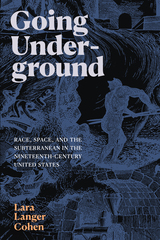
Going Underground
Race, Space, and the Subterranean in the Nineteenth-Century United States
Lara Langer Cohen
Duke University Press, 2023
First popularized by newspaper coverage of the Underground Railroad in the 1840s, the underground serves as a metaphor for subversive activity that remains central to our political vocabulary. In Going Underground, Lara Langer Cohen excavates the long history of this now familiar idea while seeking out versions of the underground that were left behind along the way. Outlining how the underground’s figurative sense first took shape through the associations of literal subterranean spaces with racialized Blackness, she examines a vibrant world of nineteenth-century US subterranean literature that includes Black radical manifestos, anarchist periodicals, sensationalist exposés of the urban underworld, manuals for sex magic, and the initiation rites of secret societies. Cohen finds that the undergrounds in this literature offer sites of political possibility that exceed the familiar framework of resistance, suggesting that nineteenth-century undergrounds can inspire new modes of world-making and world-breaking for a time when this world feels increasingly untenable.
[more]
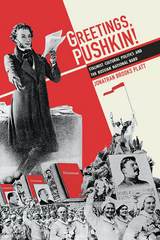
Greetings, Pushkin!
Stalinist Cultural Politics and the Russian National Bard
Jonathan Brooks Platt
University of Pittsburgh Press, 2016
In 1937, the Soviet Union mounted a national celebration commemorating the centenary of poet Alexander Pushkin’s death. Though already a beloved national literary figure, the scale and feverish pitch of the Pushkin festival was unprecedented. Greetings, Pushkin! presents the first in-depth study of this historic event and follows its manifestations in art, literature, popular culture, education, and politics, while also examining its philosophical underpinnings.
Jonathan Brooks Platt looks deeply into the motivations behind the Soviet glorification of a long-dead poet—seemingly at odds with the October Revolution’s radical break with the past. He views the Pushkin celebration as a conjunction of two opposing approaches to time and modernity: monumentalism, which points to specific moments and individuals as the origin point for cultural narratives, and eschatology, which glorifies ruptures in the chain of art or thought and the destruction of canons.
In the midst of the Great Purge, the Pushkin jubilee was a critical element in the drive toward a nationalist discourse that attempted to unify and subsume the disparate elements of the Soviet Union, supporting the move to “socialism in one country.”
Jonathan Brooks Platt looks deeply into the motivations behind the Soviet glorification of a long-dead poet—seemingly at odds with the October Revolution’s radical break with the past. He views the Pushkin celebration as a conjunction of two opposing approaches to time and modernity: monumentalism, which points to specific moments and individuals as the origin point for cultural narratives, and eschatology, which glorifies ruptures in the chain of art or thought and the destruction of canons.
In the midst of the Great Purge, the Pushkin jubilee was a critical element in the drive toward a nationalist discourse that attempted to unify and subsume the disparate elements of the Soviet Union, supporting the move to “socialism in one country.”
[more]
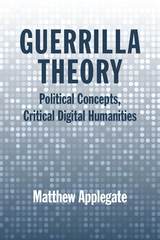
Guerrilla Theory
Political Concepts, Critical Digital Humanities
Matthew Applegate
Northwestern University Press, 2020
Guerrilla Theory examines the political, ontological, and technological underpinnings of the guerrilla in the digital humanities (DH). The figure of the guerrilla appears in digital humanities’ recent history as an agent of tactical reformation. It refers to a broad swath of disciplinary desires: digital humanities’ claim to collaborative and inclusive pedagogy, minimal and encrypted computing, and a host of minoritarian political interventions in its praxis, including queer politics, critical race studies, and feminist theory.
In this penetrating study, Matthew Applegate uses the guerrilla to connect popular iterations of digital humanities’ practice to its political rhetoric and infrastructure. By doing so, he reorients DH’s conceptual lexicon around practices of collective becoming, mediated by claims to conflict, antagonism, and democratic will.
Applegate traces Michael Hardt and Antonio Negri’s radical democratic ingresses into network theory, the guerrilla’s role in its discourse, and concerns for the digital humanities’ own invocation of the figure. The book also connects post- and decolonial, feminist, and Marxist iterations of DH praxis to the aesthetic histories of movements such as Latin American Third Cinema and the documentary cinema of the Black Panther Party. Concluding with a meditation on contemporary political modalities inherent in DH’s disciplinary expansion, Guerrilla Theory challenges the current political scope of the digital humanities and thus its future institutional impact.
In this penetrating study, Matthew Applegate uses the guerrilla to connect popular iterations of digital humanities’ practice to its political rhetoric and infrastructure. By doing so, he reorients DH’s conceptual lexicon around practices of collective becoming, mediated by claims to conflict, antagonism, and democratic will.
Applegate traces Michael Hardt and Antonio Negri’s radical democratic ingresses into network theory, the guerrilla’s role in its discourse, and concerns for the digital humanities’ own invocation of the figure. The book also connects post- and decolonial, feminist, and Marxist iterations of DH praxis to the aesthetic histories of movements such as Latin American Third Cinema and the documentary cinema of the Black Panther Party. Concluding with a meditation on contemporary political modalities inherent in DH’s disciplinary expansion, Guerrilla Theory challenges the current political scope of the digital humanities and thus its future institutional impact.
[more]
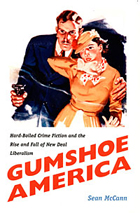
Gumshoe America
Hard-Boiled Crime Fiction and the Rise and Fall of New Deal Liberalism
Sean McCann
Duke University Press, 2000
In Gumshoe America Sean McCann offers a bold new account of the hard-boiled crime story and its literary and political significance. Illuminating a previously unnoticed set of concerns at the heart of the fiction, he contends that mid-twentieth-century American crime writers used the genre to confront and wrestle with many of the paradoxes and disappointments of New Deal liberalism. For these authors, the same contradictions inherent in liberal democracy were present within the changing literary marketplace of the mid-twentieth-century United States: the competing claims of the elite versus the popular, the demands of market capitalism versus conceptions of quality, and the individual versus a homogenized society.
Gumshoe America traces the way those problems surfaced in hard-boiled crime
fiction from the1920s through the 1960s. Beginning by using a forum on the KKK in the pulp magazine Black Mask to describe both the economic and political culture of pulp fiction in the early twenties, McCann locates the origins of the hard-boiled crime story in the genre’s conflict with the racist antiliberalism prominent at the time. Turning his focus to Dashiell Hammett’s career, McCann shows how Hammett’s writings in the late 1920s and early 1930s moved detective fiction away from its founding fables of social compact to the cultural alienation triggered by a burgeoning administrative state. He then examines how Raymond Chandler’s fiction, unlike Hammett’s, idealized sentimental fraternity, echoing the communitarian appeals of the late New Deal. Two of the first crime writers to publish original fiction in paperback—Jim Thompson and Charles Willeford—are examined next in juxtaposition to the popularity enjoyed by their contemporaries Mickey Spillane and Ross Macdonald. The stories of the former two, claims McCann, portray the decline of the New Deal and the emergence of the rights-based liberalism of the postwar years and reveal new attitudes toward government: individual alienation, frustration with bureaucratic institutions, and dissatisfaction with the growing vision of America as a meritocracy. Before concluding, McCann turns to the work of Chester Himes, who, in producing revolutionary hard-boiled novels, used the genre to explore the changing political significance of race that accompanied the rise of the Civil Rights movement in the late 1950s and the 1960s.
Combining a striking reinterpretation of the hard-boiled crime story with a fresh view of the political complications and cultural legacies of the New Deal, Gumshoe America will interest students and fans of the genre, and scholars of American history, culture, and government.
Gumshoe America traces the way those problems surfaced in hard-boiled crime
fiction from the1920s through the 1960s. Beginning by using a forum on the KKK in the pulp magazine Black Mask to describe both the economic and political culture of pulp fiction in the early twenties, McCann locates the origins of the hard-boiled crime story in the genre’s conflict with the racist antiliberalism prominent at the time. Turning his focus to Dashiell Hammett’s career, McCann shows how Hammett’s writings in the late 1920s and early 1930s moved detective fiction away from its founding fables of social compact to the cultural alienation triggered by a burgeoning administrative state. He then examines how Raymond Chandler’s fiction, unlike Hammett’s, idealized sentimental fraternity, echoing the communitarian appeals of the late New Deal. Two of the first crime writers to publish original fiction in paperback—Jim Thompson and Charles Willeford—are examined next in juxtaposition to the popularity enjoyed by their contemporaries Mickey Spillane and Ross Macdonald. The stories of the former two, claims McCann, portray the decline of the New Deal and the emergence of the rights-based liberalism of the postwar years and reveal new attitudes toward government: individual alienation, frustration with bureaucratic institutions, and dissatisfaction with the growing vision of America as a meritocracy. Before concluding, McCann turns to the work of Chester Himes, who, in producing revolutionary hard-boiled novels, used the genre to explore the changing political significance of race that accompanied the rise of the Civil Rights movement in the late 1950s and the 1960s.
Combining a striking reinterpretation of the hard-boiled crime story with a fresh view of the political complications and cultural legacies of the New Deal, Gumshoe America will interest students and fans of the genre, and scholars of American history, culture, and government.
[more]
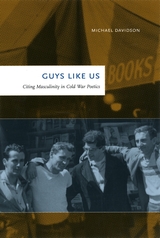
Guys Like Us
Citing Masculinity in Cold War Poetics
Michael Davidson
University of Chicago Press, 2003
Guys Like Us considers how writers of the 1950s and '60s struggled to craft literature that countered the politics of consensus and anticommunist hysteria in America, and how notions of masculinity figured in their effort. Michael Davidson examines a wide range of postwar literature, from the fiction of Jack Kerouac to the poetry of Gwendolyn Brooks, Frank O'Hara, Elizabeth Bishop, and Sylvia Plath. He also explores the connection between masculinity and sexuality in films such as Chinatown and The Lady from Shanghai, as well as television shows, plays, and magazines from the period. What results is a virtuoso work that looks at American poetic and artistic innovation through the revealing lenses of gender and history.
[more]
READERS
Browse our collection.
PUBLISHERS
See BiblioVault's publisher services.
STUDENT SERVICES
Files for college accessibility offices.
UChicago Accessibility Resources
home | accessibility | search | about | contact us
BiblioVault ® 2001 - 2024
The University of Chicago Press









